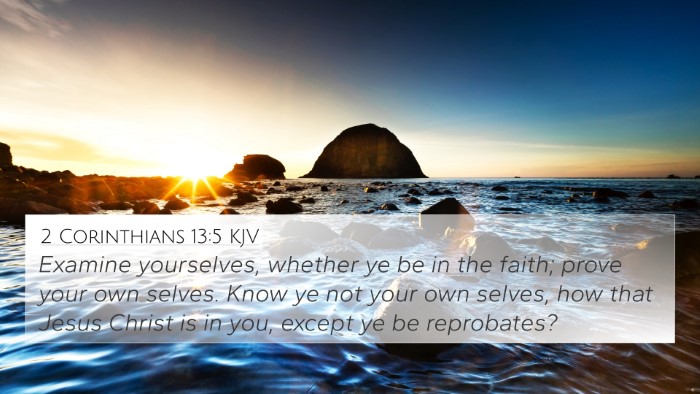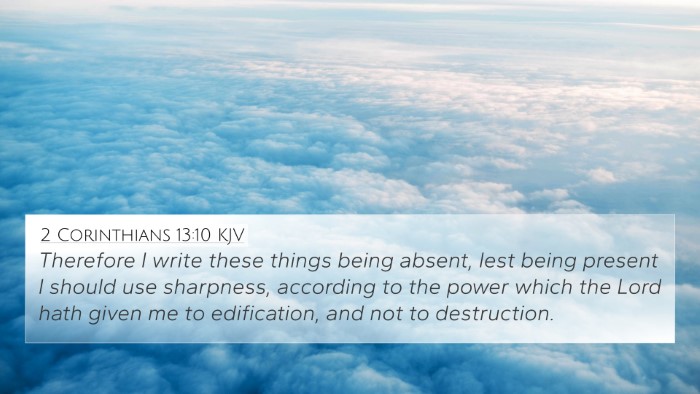Understanding 1 Corinthians 9:3
The verse states: "My defense to those who examine me is this:" This brief declaration by the Apostle Paul serves as a pivotal moment where he prepares to address criticisms that have been levied against him, primarily concerning his apostolic authority and the rights of an apostle.
Contextual Background
In the broader context of 1 Corinthians chapter 9, Paul is discussing his apostolic ministry and the rights that accompany it. His intention is to clarify his position and why he sometimes chooses not to exercise his rights, reflecting his commitment to the gospel and the welfare of the believers.
Insights from Commentaries
- Matthew Henry: Henry emphasizes the importance of defense in ministry. He critically observes that Paul addresses the scrutiny of his authority with conviction, showing that defending one's calling is vital for maintaining the integrity of the gospel.
- Albert Barnes: Barnes notes that Paul's defense is both personal and theological. He argues that the apostle establishes not just his rights but the principle that righteous living includes accountability to others. Paul wanted the Corinthians to recognize his authenticity and commitment to the gospel.
- Adam Clarke: Clarke delves into the cultural implications of Paul's defense, explaining that in his day, an apostle's rights were often challenged. He articulates that Paul’s intent was to assure the Corinthians of the sincerity and gravity of his ministry, aiming to quell any arising doubts.
Thematic Connections
This verse opens the door for understanding the intricate relationships between various biblical principles and teachings. Here are some relevant themed connections and cross-references that resonate with 1 Corinthians 9:3:
- 2 Corinthians 10:12: Paul speaks of comparing himself to others, reinforcing the theme of God’s evaluation over human judgment.
- Galatians 1:10: Paul questions whether he seeks the approval of man or God, linking back to the importance of divine justification over human scrutiny.
- 1 Thessalonians 2:4: His commitment to speaking God’s truth is paramount, aligning with the defense of his apostolic mission.
- Romans 14:4: This passage speaks on God's ultimate judgment, which further emphasizes the weight of Paul’s words regarding accountability.
- 1 Peter 3:15: It suggests being prepared to defend one's faith, which dovetails with Paul’s motivation for defending his ministry.
- Philippians 1:17: It highlights the duality of motivations in ministry, reflecting on those who preach Christ with different intentions.
- 1 Timothy 6:12: The metaphor of fight is prevalent, and Paul encourages Timothy to hold fast to eternal life, which resonates with the call to defend faith.
- Acts 20:28: Where Paul discusses his responsibility toward the church, reinforcing the pastoral role he embodies.
- Hebrews 13:17: The verse emphasizes obeying and submitting to leaders as part of the church order that Paul defends.
- John 10:12: This reflects on the shepherd metaphor that can also be seen in Paul’s role as a spiritual leader.
Applications and Reflections
Understanding the implications of 1 Corinthians 9:3 encourages believers to reflect on their leaders and their accountability. Paul’s example teaches us about humility in ministry while also advocating for a mature understanding of biblical authority. It serves to remind the church of the importance of discerning true authority and teaching, as well as the necessity to defend one's faith respectfully and earnestly.
In studying this verse, one may also explore tools for Bible cross-referencing, utilizing a Bible concordance or a Bible cross-reference guide to trace the thematic connections between the passages. Scholars suggest that engaging with these connections can provide a fuller understanding of scripture and how different verses highlight similar themes or messages. This comparative study of Pauline epistles and the interconnectedness of biblical texts can be profoundly enriching for any serious student of the Word.
Conclusion
1 Corinthians 9:3 not only reflects Paul’s defense of his ministry but also acts as a launching point for broader discussions about the nature of apostolic authority, the integrity of ministry, and the importance of accountability among believers. By exploring the rich tapestry of scripture surrounding this verse, believers can uncover deeper truths and engage in meaningful study that fosters their spiritual growth and understanding of the faith.













